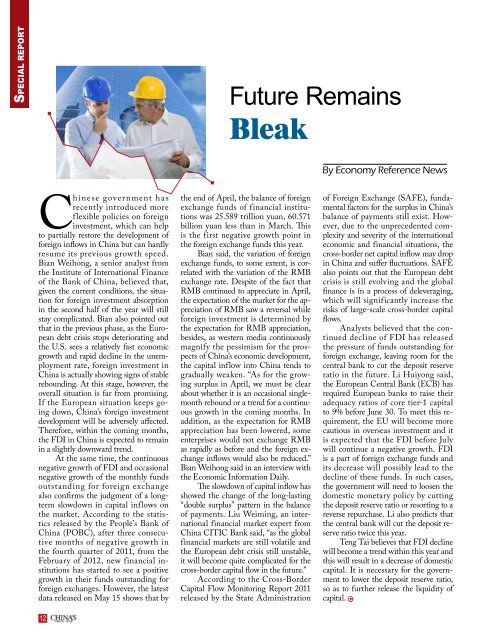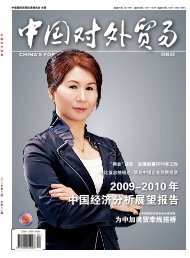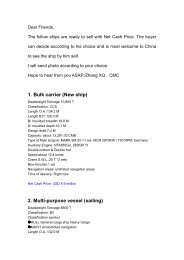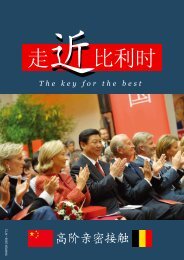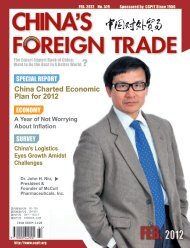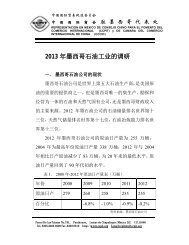F REIGN TRADE - 中国国际贸易促进委员会
F REIGN TRADE - 中国国际贸易促进委员会
F REIGN TRADE - 中国国际贸易促进委员会
Create successful ePaper yourself
Turn your PDF publications into a flip-book with our unique Google optimized e-Paper software.
Future RemainsBleakBy Economy Reference NewsChinese government hasrecently introduced moreflexible policies on foreigninvestment, which can helpto partially restore the development offoreign inflows in China but can hardlyresume its previous growth speed.Bian Weihong, a senior analyst fromthe Institute of International Financeof the Bank of China, believed that,given the current conditions, the situationfor foreign investment absorptionin the second half of the year will stillstay complicated. Bian also pointed outthat in the previous phase, as the Europeandebt crisis stops deteriorating andthe U.S. sees a relatively fast economicgrowth and rapid decline in the unemploymentrate, foreign investment inChina is actually showing signs of stablerebounding. At this stage, however, theoverall situation is far from promising.If the European situation keeps goingdown, China’s foreign investmentdevelopment will be adversely affected.Therefore, within the coming months,the FDI in China is expected to remainin a slightly downward trend.At the same time, the continuousnegative growth of FDI and occasionalnegative growth of the monthly fundsoutstanding for foreign exchangealso confirms the judgment of a longtermslowdown in capital inflows onthe market. According to the statisticsreleased by the People’s Bank ofChina (POBC), after three consecutivemonths of negative growth inthe fourth quarter of 2011, from theFebruary of 2012, new financial institutionshas started to see a positivegrowth in their funds outstanding forforeign exchanges. However, the latestdata released on May 15 shows that by12the end of April, the balance of foreignexchange funds of financial institutionswas 25.589 trillion yuan, 60.571billion yuan less than in March. Thisis the first negative growth point inthe foreign exchange funds this year.Bian said, the variation of foreignexchange funds, to some extent, is correlatedwith the variation of the RMBexchange rate. Despite of the fact thatRMB continued to appreciate in April,the expectation of the market for the appreciationof RMB saw a reversal whileforeign investment is determined bythe expectation for RMB appreciation,besides, as western media continuouslymagnify the pessimism for the prospectsof China’s economic development,the capital inflow into China tends togradually weaken. “As for the growingsurplus in April, we must be clearabout whether it is an occasional singlemonthrebound or a trend for a continuousgrowth in the coming months. Inaddition, as the expectation for RMBappreciation has been lowered, someenterprises would not exchange RMBas rapidly as before and the foreign exchangeinflows would also be reduced.”Bian Weihong said in an interview withthe Economic Information Daily.The slowdown of capital inflow hasshowed the change of the long-lasting“double surplus” pattern in the balanceof payments. Liu Weiming, an internationalfinancial market expert fromChina CITIC Bank said, “as the globalfinancial markets are still volatile andthe European debt crisis still unstable,it will become quite complicated for thecross-border capital flow in the future.”According to the Cross-BorderCapital Flow Monitoring Report 2011released by the State Administrationof Foreign Exchange (SAFE), fundamentalfactors for the surplus in China’sbalance of payments still exist. However,due to the unprecedented complexityand severity of the internationaleconomic and financial situations, thecross-border net capital inflow may dropin China and suffer fluctuations. SAFEalso points out that the European debtcrisis is still evolving and the globalfinance is in a process of deleveraging,which will significantly increase therisks of large-scale cross-border capitalflows.Analysts believed that the continueddecline of FDI has releasedthe pressure of funds outstanding forforeign exchange, leaving room for thecentral bank to cut the deposit reserveratio in the future. Li Huiyong said,the European Central Bank (ECB) hasrequired European banks to raise theiradequacy ratios of core tier-1 capitalto 9% before June 30. To meet this requirement,the EU will become morecautious in overseas investment and itis expected that the FDI before Julywill continue a negative growth. FDIis a part of foreign exchange funds andits decrease will possibly lead to thedecline of these funds. In such cases,the government will need to loosen thedomestic monetary policy by cuttingthe deposit reserve ratio or resorting to areverse repurchase. Li also predicts thatthe central bank will cut the deposit reserveratio twice this year.Teng Tai believes that FDI declinewill become a trend within this year andthis will result in a decrease of domesticcapital. It is necessary for the governmentto lower the deposit reserve ratio,so as to further release the liquidity ofcapital.


